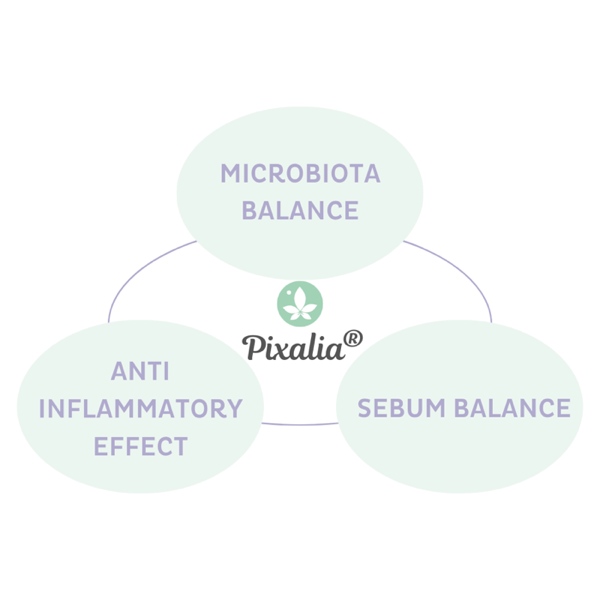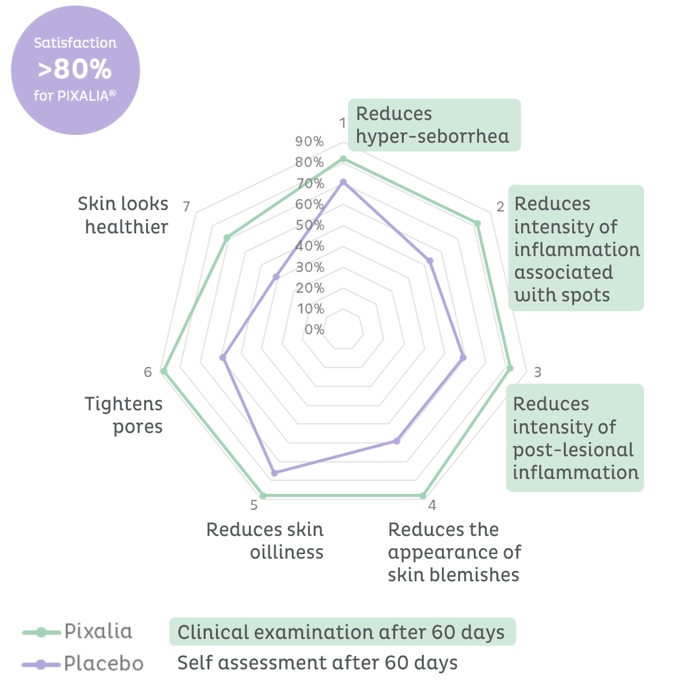Cleome gynandra, commonly named the “spider plant”, is a plant native to Africa that can be also found in all tropical and subtropical regions of the world. The plant is well known for its high level of polyphenols and particularly flavonoids, which are molecules with strong antioxidant and anti-inflammatory properties.
Extracted from the dried leaves of the plant, Expanscience’s PIXALIA® is a cosmetic active ingredient rich in polyphenols and dedicated to adult acne-prone skin.
Adult acne in women has increased 10% worldwide over the past 10 years, according to a 2022 review published in the International Journal of Dermatology [1]. Adult acne now affects more than 640 million people across the globe. This study underlines that adult acne has serious consequences, including a psychological impact, low self-esteem, social isolation, and depression.
Acne can be caused by various factors such as hormonal changes, fatigue, stress, or pollution. However, few people make the connection between the balance of their skin microbiota and acne.
Often associated with an overproliferation of the bacterium C. acnes (previously known as P. acnes), acne is in fact mainly due to a loss of diversity and an imbalance between healthy and acne-prone strains of this bacterium [2].
Specifically, C. acnes strains have been classified into six distinct phylotypes (a group of microorganisms with a phylogenetic relationship): 1 healthy (phylotype I) and 1 pathogenic (phylotype IA-2) and 4 that can be considered as “neutral”.
Our recent studies show that PIXALIA® will rebalance the skin microbiome by precisely targeting the pathogenic phylotypes.
PIXALIA® reduces the pathogenic strain of C. acnes, as well as the inflammation caused by the bacteria, all the while respecting the skin flora.
A study on bacterial growth showed a reduction in this pathogenic strain in the presence of PIXALIA®, without impacting on the commensal bacteria of the skin flora (S. epidermidis and S. homini).
Furthermore, another study was carried out on porphyrins, pro-inflammatory and virulence factors, involved in the dysbiosis of C. acnes. Porphyrins are produced in greater quantities by phylotype IA-2 (pathogenic acneic) than by phylotype II (healthy).
PIXALIA® has been shown to reduce acne inflammation by inhibiting the porphyrins produced by the acneic strain of C. acnes. By targeting only the pathogenic acne strains, PIXALIA® allows us to offer a more gentle anti-acne solution that respects the skin’s balance.
PIXALIA® rebalances the skin’s sebum
A study on skin explants (topical application of a cream containing PIXALIA® at 3% for one week, in inflammatory conditions) shows a 30% reduction in sebum production compared to placebo. This result was challenged by a second test on primary sebocytes. It is demonstrated that PIXALIA® reduces the quantity of sebum during the stimulation of seborrhoea by inflammatory stress but does not unbalance the quantity of sebum in the basal state. PIXALIA® therefore regulates hyper seborrhoea without disturbing the balance of normal to dry skin.
In addition to the quantity, PIXALIA® also acts on the quality of the sebum.
In the presence of ozone, squalene, the main component of sebum, oxidizes and forms volatile secondary metabolites, which are involved in the physiopathology of acne. Thanks to its protective effect against oxidation, PIXALIA® improves the quality of sebum.

PIXALIA® a complete solution for acne-prone skin
These in-vitro and ex-vivo results were confirmed by a randomized, double-blind clinical study of PIXALIA® 3% vs. placebo.
An innovative method of sampling skin lipids from the forehead was carried out on 34 adult women with mild to moderate acne (application twice a day for 60 days on the face of a cream containing 3% PIXALIA® or placebo – the 60-day period allowing for a complete menstrual cycle and thus taking into account hormonal changes).
After 60 days, measurements of key parameters of acne-prone skin showed that PIXALIA® 3% optimized the quantity and quality of sebum, and restored the hydrolipidic film:
![]() significant reduction of -28% in squalene;
significant reduction of -28% in squalene;
![]() significant reduction of -39% of peroxidised squalene (comedogenic and pro-inflammatory);
significant reduction of -39% of peroxidised squalene (comedogenic and pro-inflammatory);
![]() significant +32% increase in glycerides, key components of the hydrolipidic film that helps protect the skin.
significant +32% increase in glycerides, key components of the hydrolipidic film that helps protect the skin.
In addition, a clinical examination by a dermatologist and a self-assessment showed a significant improvement with PIXALIA®, with an overall satisfaction rate of over 80%.

PIXALIA® normalizes the key parameters of acne-prone skin while restoring its protective film: it is smoothed, purified and regains a healthier appearance.
By acting on the quality and quantity of sebum, rebalancing the microbiome and reducing inflammation, PIXALIA® provides a complete solution to the problems associated with acne-prone skin.
PIXALIA® is a water-soluble, preservative-free and COSMOS-approved active ingredient.






















